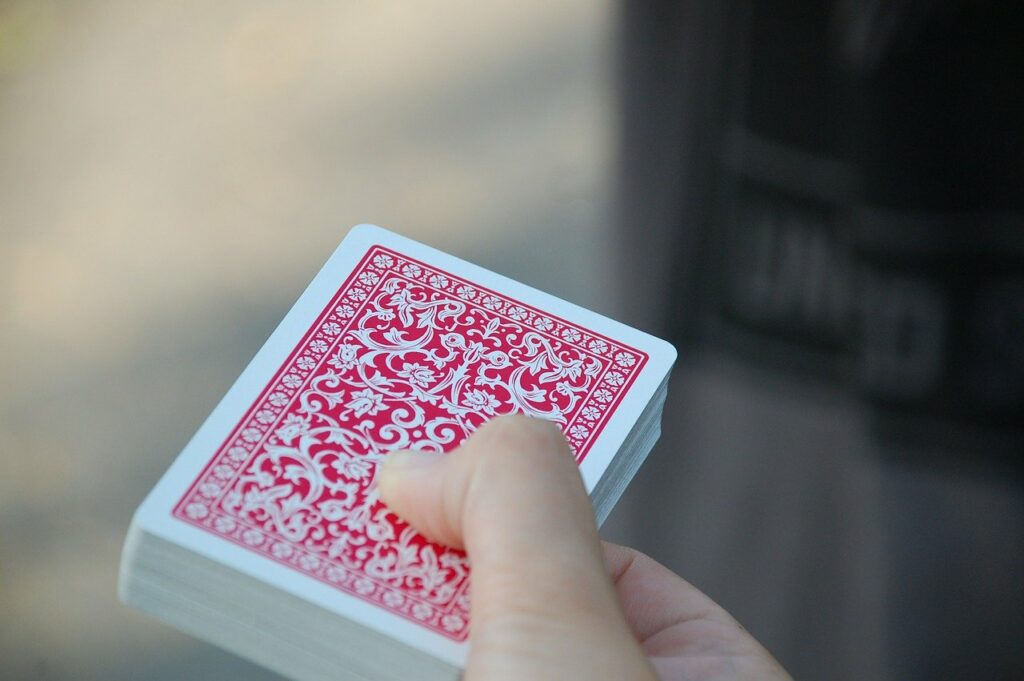Is crypto trading just gambling? On the surface, crypto trading and gambling look similar. They both involve putting money down to get more money. However, traders disagree that crypto trading is gambling, while gamblers go by the saying, “Everyone gambles.” According to them, this means that crypto and gambling are one. This article will be making a comparison of both of them to show their differences and similarities.

Is Crypto Trading Just Gambling? Here Are Some Similarities
- Goals
The goal of every gambler is to make more money from whatever money they are depositing. A good case study for this would be most online casinos, which offer players rewards as high as $100 for a $20 deposit. Thus, these casinos present the impression that a gambler’s goal to make more money is achievable. Similarly, a crypto trader trades their coins intending to increase their wallet earnings. However, even though making more money is a gambler/crypto trader’s primary goal, certain questions will guide them in reaching this goal.
What Games Should They Play vs. What Coins Should They Buy?
The Gambler
What games should they play? Should they go for games with low odds or those with high risks? Horse racing or car racing? Table games or slot games?
The Crypto Trader
Which coins should they buy? Should they purchase coins with limited or unlimited supply? Should they chase a runner coin, that is, a coin that is rapidly appreciating? Or should they buy a coin that is appreciating slowly?
How Many Hours Should They Play/Trade?
The Gambler
How many hours should they gamble in a day/week without falling into problem gambling? These hours are not just for making bets and hoping to win; they are studying the game strategies.
The Crypto Trader
How many hours should they set aside to trade daily? Or would they be checking on their trading at random? Which one is preferable, night or day trading?

What Is The Budget?
The Gambler
What is the daily/weekly/monthly budget for games? What happens if they use up the budget and still do not get any winnings? Would they increase their budget or say goodbye to the games? Would their budget maintain a certain amount, or would they increase/reduce it as time goes on?
The Crypto Trader
How much do they want to invest in cryptocurrency daily/weekly/monthly? Would they increase their investment daily or monthly? What happens if they suffer a loss? Would they wait to recoup their loss, or would they sell off their investment at a lower price?
Short-Term vs. Long Term
The Gambler
For how long will they gamble? Is it a try-your-luck-this-one-time thing, or will they stay until they hit the jackpot? What will happen after they hit the jackpot: would they continue gambling or quit? What happens when months/years pass and they don’t hit the jackpot? Will they quit, or will they remain in the game?
The Crypto Trader
In cryptocurrency, the word “hold” is interchanged for “hodl” but they mean the same thing. How long will the trader hodl/trade an unstable coin? Do they have a target price? Would they continue trading even after they’ve met their target price?
Profession or Side Hobby?
The Gambler
Do they intend to go into gambling full-time, or will it be a side hobby? Becoming a professional gambler means they’ll have to quit their jobs to learn the skills and strategies of their games. On the other hand, making gambling, a side hobby means limiting playing games to two or three times weekly.

The Crypto Trader
Is crypto trading something one can do as a side hobby? Anyone who intends to go into crypto trading full-time must be prepared to do a lot of day trading.
When Is It Enough?
The Gambler
When do they pull out of a game? Is it when they continue losing money at a particular game over and again? Should they pull out immediately if they win or continue to take higher risks? When they lose money at the table, should they continue playing or leave?
The Crypto Trader
When should they pull out their investment in a coin? When a coin is depreciating, should it continue trading in hopes that it will appreciate it?
- Risks
Gambling involves taking risks, whether low or high. The gambler is sacrificing their money in the hopes of getting more money. In gambling, the house has the most advantage over the player, so the gambler may be prepared for more loss than profit.
Although crypto trading involves risk in the same manner as gambling, there are more risks to this. As a digital coin, cryptocurrency is open to cyber insecurities like hacking and fraud. According to stories on the Internet, many crypto traders lose their money daily through hacked exchanges. Also, with more cryptocurrency coins coming onto the market, fraudsters are now in the business of selling fake coins to unsuspecting traders. Unfortunately, many buyers, especially new traders who are in a hurry to trade, cannot tell and fall, victim. In addition to this, crypto traders can lose all their investments if they forget their password or recovery method. That’s how much risk crypto traders take.
Apart from these risks, there are unhealthy risks that both gamblers and crypto traders take. Usually, when gambling or investing, it is advisable to do so with money you can afford to lose. However, some people see gambling or crypto trading as a get-rich-quick scheme. Thus, they may use their house rent, tuition fees, lifetime savings, pawn expensive personal items, etc., to put into gambling or a trade. While very few people are lucky to get a huge return on their money through this means, others are not. The result of this is running into huge debts and being unable to pay them back.
- Volatility
Volatility in gambling usually applies to slot machines and connotes the amount of risk a particular game carries. For example, you can win big on some games, but these wins only happen occasionally and not all the time. These games are m high volatility games. Similarly, there are games where you get to win more often, but the payouts are smaller. These are low volatility games.
In gambling, because the house designed the games in its favor, the gambler has low odds of winning. Although casinos promise a jackpot win, very few gamblers have ever won one in gambling history.
Similarly, the crypto trading market is volatile. Cryptocurrency prices rise and fall, which means you could lose all your investment suddenly or make huge profits.
What Are The Differences?
- Source Tracing
In gambling, it is easy to trace the source of the funds. This is because gamblers use their credit/debit cards to make deposits more often than not. These cards have personal details on them so banks and financial regulators can easily identify the gambler.
With cryptocurrency, it is a whole different process. Crypto traders make deposits into a virtual wallet that is not audited by any regulatory board. This means that the money can come from anyone and anywhere. Although anyone can view the transactions on the blockchain, you can’t tell who exactly is doing them.
- Prediction
In gambling, especially sports betting, you can predict your way into money. All you need to do is, well, predict. If you predict correctly, you win your bets. If you don’t, you lose them. It’s that simple.
In crypto trading, you cannot always predict the prices of the coin. A coin may be on a steady rise only for it to fall as quickly. This is not to say that crypto traders don’t make predictions. They do; however, most times, these predictions are needless. As some experienced traders would say, these predictions are overhyped by some CEOs who have their personal motives.
- Money Making Opportunities
As much as gambling is a way to make money, money-making opportunities are low. There’s a high possibility of playing five different games and losing at all of them instead of winning. Games that present high payouts are not easy to win, and the opportunities only come occasionally. Games that present opportunities for frequent payouts offer low payouts.
In cryptocurrency, there are many money-making opportunities. For example, you can buy many different coins and reap huge profits from some or all of them.
Conclusion
Is crypto trading just gambling? Yes, there are similarities between the two, so also are their significant differences.



